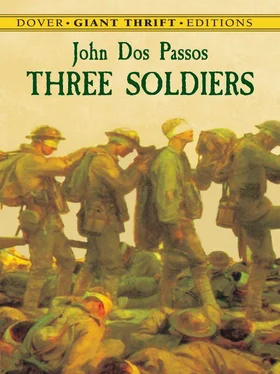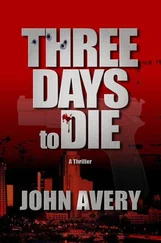Suddenly he started up; he had been dozing. He asked an old man with a beautifully pointed white beard the way to rue du Faubourg St. Honoré.
After losing his way a couple of times, he walked listlessly up some marble steps where a great many men in khaki were talking. Leaning against the doorpost was Walters. As he drew near Andrews heard him saying to the man next to him:
“Why, the Eiffel tower was the first piece of complete girder construction ever built… That’s the first thing a feller who’s wide awake ought to see.”
“Tell me the Opery’s the grandest thing to look at,” said the man next it. “If there’s wine an’ women there, me for it.”
“An’ don’t forget the song.”
“But that isn’t interesting like the Eiffel tower is,” persisted Walters.
“Say, Walters, I hope you haven’t been waiting for me,” stammered Andrews.
“No, I’ve been waiting in line to see the guy about courses… I want to start this thing right.”
“I guess I’ll see them tomorrow,” said Andrews.
“Say have you done anything about a room, Andy? Let’s you and me be bunkies.”
“All right… But maybe you won’t want to room where I do, Walters.”
“Where’s that? In the Latin Quarter?… You bet. I want to see some French life while I am about it.”
“Well, it’s too late to get a room today.”
“I’m going to the ‘Y’ tonight anyway.”
“I’ll get a fellow I know to put me up… Then tomorrow, we’ll see. Well, so long,” said Andrews, moving away.
“Wait. I’m coming with you… We’ll walk around town together.”
“All right,” said Andrews.
The rabbit was rather formless, very fluffy and had a glance of madness in its pink eye with a black center. It hopped like a sparrow along the pavement, emitting a rubber tube from its back, which went up to a bulb in a man’s hand which the man pressed to make the rabbit hop. Yet the rabbit had an air of organic completeness. Andrews laughed inordinately when he first saw it. The vendor, who had a basket full of other such rabbits on his arm, saw Andrews laughing and drew timidly near to the table; he had a pink face with little, sensitive lips rather like a real rabbit’s, and large frightened eyes of a wan brown.
“Do you make them yourself?” asked Andrews smiling. The man dropped his rabbit on the table with a negligent air.
“Oh, oui, Monsieur, d’après la nature.”
He made the rabbit turn a summersault by suddenly pressing the bulb hard. Andrews laughed and the rabbit man laughed.
“Think of a big strong man making his living that way,” said Walters, disgusted.
“I do it all… de matière première au profit de l’accapareur,” said the rabbit man.
“Hello, Andy… late as hell… I’m sorry,” said Henslowe, dropping down into a chair beside them. Andrews introduced Walters, the rabbit man took off his hat, bowed to the company and went off, making the rabbit hop before him along the edge of the curbstone.
“What’s happened to Heineman?”
“Here he comes now,” said Henslowe.
An open cab had driven up to the curb in front of the café. In it sat Heineman with a broad grin on his face and beside him a woman in a salmon-colored dress, ermine furs and an emerald-green hat. The cab drove off and Heineman, still grinning, walked up to the table.
“Where’s the lion cub?” asked Henslowe.
“They say it’s got pneumonia.”
“Mr. Heineman. Mr. Walters.”
The grin left Heineman’s face; he said: “How do you do?” curtly, cast a furious glance at Andrews and settled himself in a chair.
The sun had set. The sky was full of lilac and bright purple and carmine. Among the deep blue shadows lights were coming on, primrose-colored street lamps, violet arc lights, ruddy sheets of light poured out of shop windows.
“Let’s go inside. I’m cold as hell,” said Heineman crossly, and they filed in through the revolving door, followed by a waiter with their drinks.
“I’ve been in the Red Cross all afternoon, Andy… I think I am going to work that Roumania business… Want to come?” said Henslowe in Andrews’ ear.
“If I can get hold of a piano and some lessons and the concerts keep up you won’t be able to get me away from Paris with wild horses. No, sir, I want to see what Paris is like… It’s going to my head so it’ll be weeks before I know what I think about it.”
“Don’t think about it… Drink,” growled Heineman, scowling savagely.
“That’s two things I’m going to keep away from in Paris; drink and women… And you can’t have one without the other,” said Walters.
“True enough… You sure do need them both,” said Heineman.
Andrews was not listening to their talk; twirling the stem of his glass of vermouth in his fingers, he was thinking of the Queen of Sheba slipping down from off the shoulders of her elephant, glistening fantastically with jewels in the light of crackling, resinous torches. Music was seeping up through his mind as the water seeps into a hole dug in the sand of the seashore. He could feel all through his body the tension of rhythms and phrases taking form, not quite to be seized as yet, still hovering on the borderland of consciousness. From the girl at the cross-roads singing under her street-lamp to the patrician pulling roses to pieces from the height of her litter… All the imaginings of your desire… He thought of the girl with skin like old ivory he had seen in the Place de Medicis. The Queen of Sheba’s face was like that now in his imaginings, quiet and inscrutable. A sudden cymbal-clanging of joy made his heart thump hard. He was free now of the imaginings of his desire, to loll all day at café tables watching the tables move in changing patterns before him, to fill his mind and body with a reverberation of all the rhythms of men and women moving in the frieze of life before his eyes; no more like wooden automatons knowing only the motions of the drill manual, but supple and varied, full of force and tragedy.
“For Heaven’s sake let’s beat it from here… Gives me a pain this place does.” Heineman beat his fist on the table.”
“All right,” said Andrews, getting up with a yawn.
Henslowe and Andrews walked off, leaving Walters to follow them with Heineman.
“We’re going to dine at Le Rat qui Danse,” said Henslowe, “an awfully funny place… We just have time to walk there comfortably with an appetite.”
They followed the long dimly-lighted Rue de Richelieu to the Boulevards, where they drifted a little while with the crowd. The glaring lights seemed to powder the air with gold. Cafés and the tables outside were crowded. There was an odor of vermouth and coffee and perfume and cigarette smoke mixed with the fumes of burnt gasoline from taxicabs.
“Isn’t this mad?” said Andrews.
“It’s always carnival at seven on the Grands Boulevards.”
They started climbing the steep streets to Montmartre. At a corner they passed a hard-faced girl with rouge-smeared lips and over-powdered cheeks, laughing on the arm of an American soldier, who had a sallow face and dull-green eyes that glittered in the slanting light of a street-lamp.
“Hello, Stein,” said Andrews.
“Who’s that?”
“A fellow from our division, got here with me this morning.”
“He’s got curious lips for a Jew,” said Henslowe.
At the fork of two slanting streets, they went into a restaurant that had small windows pasted over with red paper, through which the light came dimly. Inside were crowded oak tables and oak wainscoting with a shelf round the top, on which were shell-cans, a couple of skulls, several cracked majolica plates and a number of stuffed rats. The only people there were a fat woman and a man with long grey hair and beard who sat talking earnestly over two small glasses in the center of the room. A husky-looking waitress with a Dutch cap and apron hovered near the inner door from which came a great smell of fish frying in olive oil.
Читать дальше












